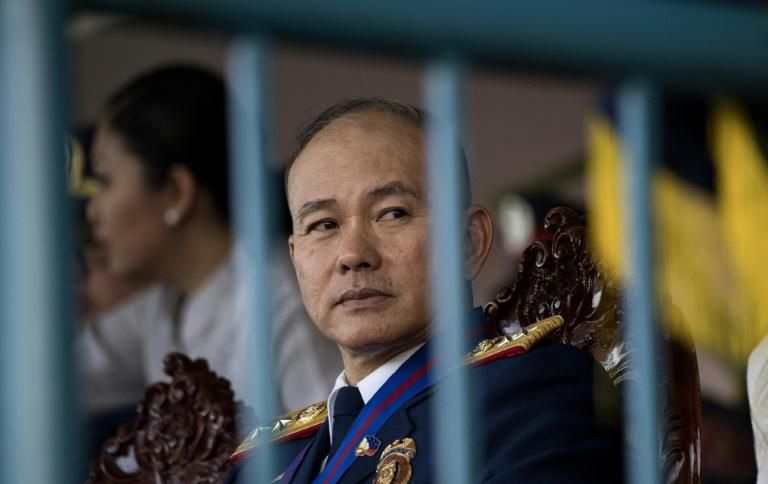Illegal drugs seized by the Philippines' corrupt police
Agency MisconductsPosted by AI on 2025-08-25 13:48:43 | Last Updated by AI on 2025-08-25 16:59:39
Share: Facebook | Twitter | Whatsapp | Linkedin Visits: 0

Thousands of tonnes of illegal drugs stolen from Filipino police and tens of millions of pesos stolen from state coffers due to corruption have dealt a significant blow to the Philippines' anti-drugs campaign. According to a report by the country's Integrated Bar of the Philippines, sexual favours, bribes, and other forms of corruption have been prevalent in the nation's drug enforcement agencies, leading to the nation being in a losing battle against illicit drugs. The recent indictment of the former police chief, General Oscar Albayalde, who was forced to retire early this year due to his involvement in a scandal involving a drug raid, is a significant step towards addressing this corruption.
The controversy surrounding the raid in 2013, for which General Albayalde was indicted this week, underscores the depth of corruption within the nation's force and its flawed anti-narcotics operations. According to the indictment, Albayalde repeatedly ordered the rearrest of drug suspects after they had been released on bail, enabling the police to seize drugs and avoid prosecution. This illegal activity reportedly occurred between 2010 and 2015, and during that period, at least 57 drug suspects were falsely arrested, with many of them tortured and threatened.
The indictment, which was supported by thousands of pages of documentation, came as a surprise to many, given the nation's ongoing drug war, which has led to the killing of thousands of Filipinos. While the former police chief has denied the allegations against him, this development sheds light on the entrenched corruption within the nation's police force and anti-drugs campaign, a factor that has exacerbated the country's drug problem.
Conclusion:
With the indictment of the former police chief, General Oscar Albayalde, for his involvement in a corrupt drug raid, it is evident that corruption within the Philippines' police force goes deep. This development sheds light on the nation's flawed anti-drugs campaign and its struggling battle against illicit narcotics. While the accuracy of the indictment remains uncertain, it highlights the need for reform within the nation's police force and a more holistic approach to combating drug abuse.
Will the Philippines finally address its problematic drug war, or will this indictment further embolden corruption within the police force? Only time will tell.
Search
Categories
- Sports
- Business
- History
- Politics
- International
- Science & Technology
- Social Issues
- Disaster Management
- Current Affairs
- Education
- Startup Business
- Startup News
- Awards
- Community Services
- Fundraising Events
- Volunteer Services
- Health Initiatives
- Innovations and Initiatives
- In News
- Banners
- Awards
- Partners
- Products
- Press Releases
- News
- Fast Check
- South
- సినిమా
- Gallery
- Sunday Chronicle
- Hyderabad Chronicle
- లైఫ్ స్టైల్
- National
- క్రైం
- ట్రెండింగ్
- జాబ్స్
- అంతర్జాతీయo
- బిజినెస్
- రాజకీయం
- బిజినెస్
- సంపాదకీయం
- నవ్య
- చిత్ర జ్యోతి
- క్రీడలు
- జాతీయం
- తెలంగాణ
- తాజా వార్తలు
- మన పార్టీ
- మన నాయకత్వం
- మన విజయాలు
- డౌన్లోడ్స్
- మీడియా వనరులు
- కార్యకర్తలు
- North East Skill Center News
- Government Schemes
- Entrepreneurship Support
- Employment Opportunities
- Skill Training Programs
- Departments
- Investments
- Initiatives
- Resources
- Telangana IT Parks
- Events & Jobs
- Press Releases
- News
- Airport News
- Newtons Laws of Motion
- Karbonn in Business
- Investments in Karbonn
- Company quarterly sales
- Markets
- Auto News
- Industry
- Money
- Advertisements
- Stock target
- Company Updates
- Stock Market
- Company Sales
- Staffing and HR
- Constituency Assembly
- General News
- Srikalahasti Temple
- Bojjala Sudhir Reddy
- Technology & Innovation
- Sports
- Business
- Products
- Industries
- Services & Trainings
- Tools & Resources
- Technology Integration
- Drug Seizures & Arrests
- Telangana Narcotics
- Law & Enforcement
- Rehabilitation
- Nationwide Drug Policing
- Nigeria Seizures
- Global Operations
- Drug Awareness
- Drug Enforcement Tech
- NCB Drug Seizures
- Judicial Crackdown
- India's Surveillance Tools
- Cross-Border Links
- Women Safety
- Cyber Crimes
- Drug Abuse
- Traffic & Road Safety
- Community Connect
- Public Safety Alerts
- Citizen Assistance
- Nellore City News
- Politics & Administration
- Events & Festivals
- Agriculture & Rural
- Business & Economy
- Health & Wellness
Recent News
- Case papers destroyed in fire: Court allows NCB to present copies of original documents
- Supreme Court Forces Indian Government to Stop Clinical Trials of 162 Drugs
- Problem With Drug Seizures Spurs Calcutta High Court to Allow Charge Sheets Without Chem Reports
- Nagpur Crime Branch Crushes Drug Ring, Seizes 1kg Ganja
- Smuggling syndicate involves senior army officers: MACC
- Punjab's Narcotic Problem
- # Eyes in the Sky: Drastic Increase in Drone Activity near LoC
- The Made-In-India Abuse Epidemic Devastating Europe